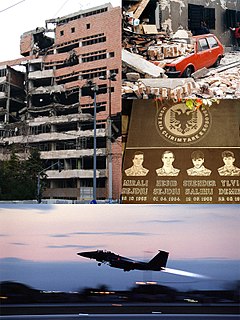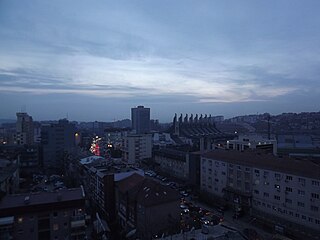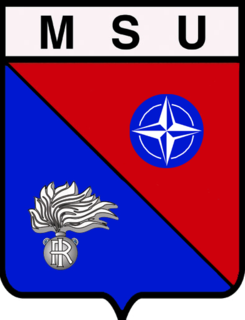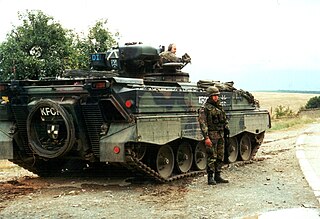 W
WThe Kosovo War was an armed conflict in Kosovo that started in February 1998 and lasted until 11 June 1999. It was fought by the forces of the Federal Republic of Yugoslavia, which controlled Kosovo before the war, and the Kosovo Albanian rebel group known as the Kosovo Liberation Army (KLA), with air support from the North Atlantic Treaty Organisation (NATO) from 24 March 1999.
 W
WCamp Bondsteel is the main base of the United States Army under KFOR command in Kosovo. Located near Ferizaj in the eastern part of Kosovo, the base serves as the NATO headquarters for KFOR's Multinational Battle Group East (MNBG-E). The base is named after Vietnam War Medal of Honor recipient United States Army Staff Sergeant James L. Bondsteel.
 W
WCampbell v. Clinton, 203 F.3d 19, was a case holding that members of Congress could not sue President Bill Clinton for alleged violations of the War Powers Resolution in his handling of the war in Yugoslavia.
 W
WFrom August 1998 to September 2000, at least seven Serbian journalists disappeared and are believed to have been killed in Kosovo, during and in the aftermath of the Kosovo War (1998–99). The perpetrators are assumed to have been Kosovo Liberation Army (KLA) members, but there has been no convictions.
 W
WIdentity cleansing is defined as "confiscation of personal identification, passports, and other such documents in order to make it difficult or impossible for those driven out to return".
 W
WThe Insurgency in Kosovo began in 1995, following the Dayton Agreement. In 1996, the Kosovo Liberation Army (KLA) began attacks, which targeted ethnic Serb villages and Serbian governmental buildings and police stations. The insurgency led to the Kosovo War in February 1998.
 W
WThe International Tribunal for the Prosecution of Persons Responsible for Serious Violations of International Humanitarian Law Committed in the Territory of the Former Yugoslavia since 1991, more commonly referred to as the International Criminal Tribunal for the former Yugoslavia (ICTY), was a body of the United Nations established to prosecute serious crimes committed during the Yugoslav Wars, and to try their perpetrators. The tribunal was an ad hoc court located in The Hague, Netherlands.
 W
WThe Kosovo Force (KFOR) is a NATO-led international peacekeeping force in Kosovo. Its operations are gradually reducing until Kosovo's Security Force, established in 2009, becomes self sufficient.
 W
WThe Kosovo Liberation Army was an ethnic-Albanian separatist militia that sought the separation of Kosovo from the Federal Republic of Yugoslavia (FRY) and Serbia during the 1990s and the eventual creation of Greater Albania due to the presence of a vast ethnic majority of Albanians in the region, stressing Albanian culture, ethnicity and nation.
 W
WKosovo refugees in Albania refers to the mostly ethnic Albanians of Kosovo fleeing the Kosovo War into neighboring Albania in 1999. This crisis was exceptional at the time, as a movement of population this big in such a short period of time was unseen since WWII. In addition to the ones going to Albania, a large number of Kosovo refugees fled to the Republic of Macedonia. Almost all of the remaining 500,000 to 600,000 individuals in Kosovo were also displaced in the region itself, without leaving it.
 W
WMemorial Chapel was built in memory of the 1999 NATO bombing of the Federal Republic of Yugoslavia victims from the city of Niš. The chapel was built by the City government of Niš, and it is situated on Sumatovacka Street near Niš Fortress and Banovina palace, currently seat of the University of Niš.
 W
WThe Multinational Specialized Unit (MSU), is a unit of the Carabinieri, dedicated to the military missions abroad, including the military and civilian police tasks, peacekeeping operations, crowd and riot control.
 W
WA confrontation between Russian forces and NATO forces over the Pristina International Airport occurred on 12 June 1999, in the aftermath of the Kosovo War. Russian troops occupied the airport ahead of a NATO deployment, resulting in a tense stand-off, which was resolved peacefully.
 W
WThe Prizren Incident, also known among German troops as "Bloody Sunday", was a confrontation between German Kosovo Force (KFOR) troops advancing into Kosovo and stragglers from the withdrawing Yugoslav Army. The shootout took place in the city of Prizren, on 13 June 1999. The German troops killed one armed Serb on the spot, while another one died of wounds later. A German soldier was injured by return fire, and there were reports of a woman wounded by Serb snipers.
 W
WSerbia was involved in the Yugoslav Wars in the period between 1991 and 1999—the war in Slovenia, the war in Croatia, the war in Bosnia and the war in Kosovo. During this period from 1991 to 1997, Slobodan Milošević was the President of Serbia, Serbia was part of the Federal Republic of Yugoslavia, the International Criminal Tribunal for the Former Yugoslavia (ICTY) has established that Milošević was in control of Serb forces in Bosnia and Herzegovina and Croatia during the wars which were fought there from 1991 to 1995.
 W
WThe Special Police Units or Police Special Units was a special police force unit of the Ministry of Internal Affairs of Serbia (MUP). It had several detachments and was part of the sector of the State Security Service. It was disbanded on Vidovdan in 2001 when it was replaced by the re-establishment of the Gendarmery.
 W
WUnited Nations Security Council resolution 1239, adopted on 14 May 1999, after recalling resolutions 1160 (1998), 1199 (1998) and 1203 (1998), the Council called for access for the United Nations and other humanitarian personnel operating in Kosovo to other parts of the Federal Republic of Yugoslavia.
 W
WUnited Nations Security Council resolution 1244, adopted on 10 June 1999, after recalling resolutions 1160 (1998), 1199 (1998), 1203 (1998) and 1239 (1999), authorised an international civil and military presence in the Federal Republic of Yugoslavia and established the United Nations Interim Administration Mission in Kosovo (UNMIK). It followed an agreement by Yugoslav President Slobodan Milošević to terms proposed by President of Finland Martti Ahtisaari and former Prime Minister of Russia Viktor Chernomyrdin on 8 June, involving withdrawal of all Yugoslav state forces from Kosovo.